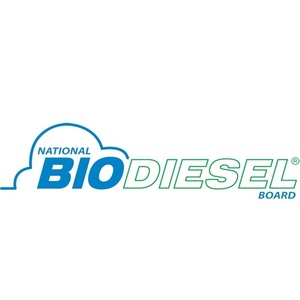Pilot project drives more than 600,000 miles on B100

December 6, 2021
BY National Biodiesel Board
B100 is one step closer to being a reality for commercial fleet operations thanks to the results of a pilot program that tested the fuel in five class-8 over-the-road trucks. The pilot, which was a collaboration among ADM, Optimus Technologies, Illinois Soybean Association, American Lung Association and the Missouri Soybean Merchandising Council, opens a pathway for significantly higher volumes of biodiesel in U.S. fleets moving forward.
“Today, most diesel engine manufacturers allow biodiesel up to B20 in their engines, but as we look toward the future and carbon reduction needs, we are looking for opportunities to run higher blends in this very necessary market,” says Scott Fenwick, technical director of the National Biodiesel Board. “The Optimus Vector System, an after-market system, allows engines to run on almost entirely B100 fuel year-round. And, run they did.”
The program, partially funded through the soybean checkoff, started in February of 2020 and ended in July 2021 with the five trucks totaling 623,922 miles during the trial.
Advertisement
The trucks used 73,186 gallons of B99.9, all being supplied through ADM’s Mexico, Missouri, soybean crush and biodiesel production facility, and ran in temperatures as low as -23F with zero operational challenges being reported.
“By using B100 in this study, we were able to reduce CO2 emissions by an estimated 1,376,048 lbs and demonstrate the impact biodiesel can have on carbon reductions moving forward,” says Colin Huwyler, CEO of Optimus Technologies. “The results of this study, including the fuel mileage parity observed by the drivers, continues to demonstrate a pathway forward for B100 in the commercial trucking sector.”
The nearly 18-month project evaluated the Optimus Vector System in longer-haul over-the-road fleets. The system, already in use in shorter-mileage, local fleet applications, is expanding into long-haul, commercial fleets moving forward. The technology provides a cost-effective alternative to electrification for decarbonizing commercial fleets.
Advertisement
“Our U.S. supply chain depends on long-haul trucks and we don’t see that changing anytime soon,” says Steve Finn, vice president of ADM trucking. “This study helps give us and other fleets the data they need to feel secure in implementing new fuel blends to add to their sustainability efforts without sacrificing efficiencies.”
Technical data from the pilot includes fuel economy, performance and a look inside the engines themselves to evaluate emissions after treatment devices, fuel injectors and general wear. The official results will be released in 2022.
Related Stories
The U.S. EPA on May 14 delivered two RFS rulemakings to the White House OMB, beginning the interagency review process. One rule focuses on RFS RVOs and the other focuses on a partial waiver of the 2024 cellulosic RVO.
The U.S. EPA on May 15 released data showing nearly 1.79 billion RINs were generated under the RFS in April, down from 2.09 million generated during the same month of last year. Total RIN generation for the first four months of 2025 was 7.12 billion.
Calumet Inc. on May 9 announced sustainable aviation fuel (SAF) capacity at its Montana Renewables biorefinery is expected to reach 120 MMgy to 150 MMgy sooner than previously reported for a fraction of the originally expected cost.
Tidewater Renewables on May 8 announced that its 3,000-barrel-per-day renewable diesel plant in Prince George, British Columbia, operated at 75% capacity during the first quarter, up from 71% during the same period of last year.
Aemetis Inc. released Q1 results on May 8, reporting increased biogas production, progress with efficiency improvements at the Keyes ethanol plant, and resumed biodiesel deliveries. Financing activities are also underway for a proposed SAF project.
Upcoming Events










